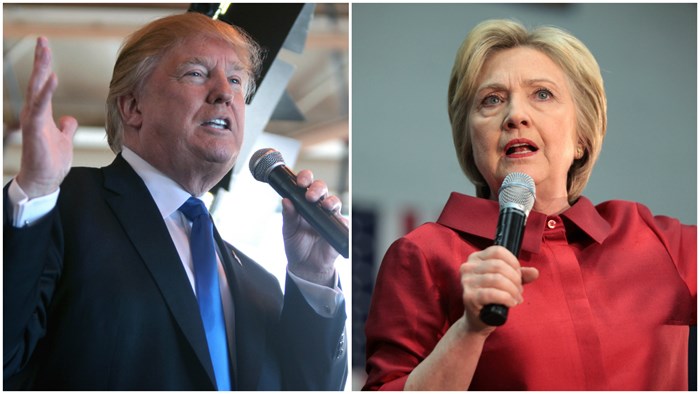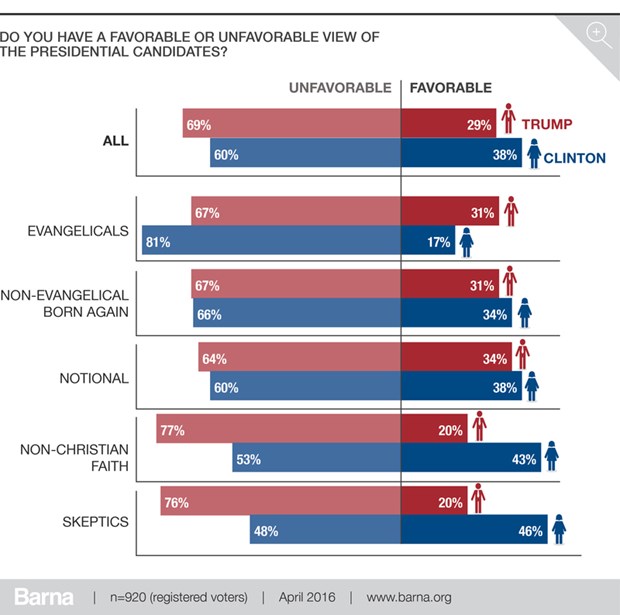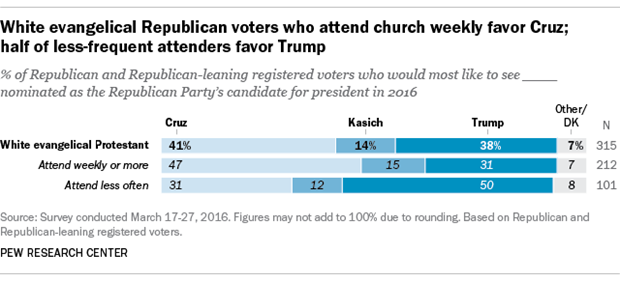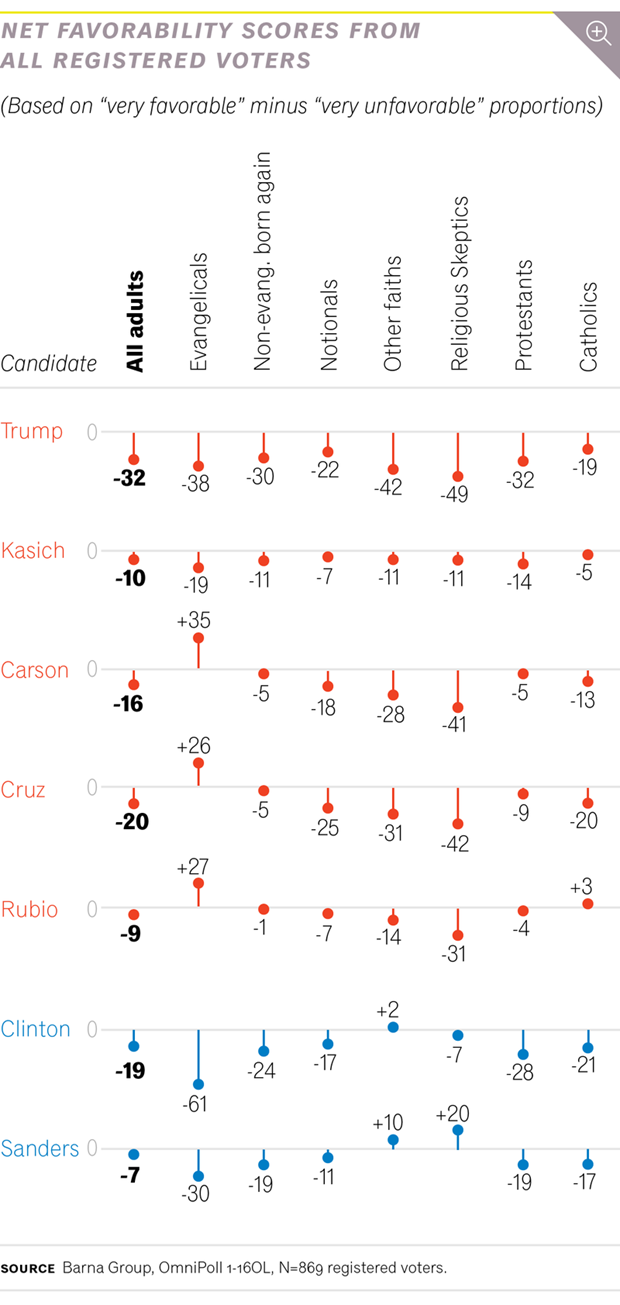
Update (May 11): Donald Trump is viewed unfavorably by 67 percent of registered evangelical voters, while Hillary Clinton is viewed unfavorably by 81 percent, according to a new survey by Barna Group. Its full chart is embedded below.
By comparison, in World magazine’s latest poll of “evangelical insiders,” 51 percent of the 77 respondents said they would never vote for Trump, while 21 percent said they would vote for him. Only 1 percent said they would vote for Clinton.
Instead, 46 percent told World that they would vote for a third-party candidate, regardless of that candidate’s chance of winning.
Meanwhile, NBC News took a “deep dive” through its exit polls and found that “white evangelicals lacked a distinctive leader for their cause for the first time in three election cycles.”
A plurality of self-identified white evangelicals voted for Trump (40%), while the majority split their votes between Ted Cruz (34%), Marco Rubio (11%), and John Kasich (10%).
NBC News found that, according to its exit polls, white evangelicals composed 48 percent of Republican primary voters in 2016. This was the same share as in 2012, and an increase from 37 percent of GOP voters in 2008.

A definition of these faith segments is at the bottom of this post.
-----
When Ted Cruz and John Kasich pulled out of the presidential race this week, they left voters one “yuge” step closer to having to choose between Donald Trump and Hillary Clinton this fall.
And they left churchgoing Christians, who largely supported Cruz, without a clear candidate to rally behind.
“The Battleground Poll has the Clinton-Trump God gap at under 15 points, with those who say they go to church at least once a week preferring Trump to Clinton by nine points and those attending less frequently preferring Clinton to Trump by less than six,” noted Mark Silk, director of the Center for the Study of Religion in Public Life at Trinity College, on his Religion News Service blog. “That compares to a God gap in 2012 of nearly 40 points.”
In fact, for the first time, a person’s vote is more easily predicted by their gender than their level of religiosity. “Since the God gap became salient in the 1990s, it’s always exceeded the gender gap,” Silk wrote. “Not, evidently, this year.”
The shrinking “God gap” hinges on the oft-debated definition of evangelical. Polls show that support for Trump is much higher among those who don’t attend church regularly than among those who worship weekly.

Without a clear horse in the race, many churchgoing evangelicals might join their fellow Americans in staying home.
Polling just ahead of Cruz’s concession showed that anywhere from 16 percent to 24 percent of voters said that if faced with a Trump vs. Clinton matchup, they would choose to stay home or vote for a third-party candidate.
According to Reuters, 20 percent of self-identified “born again Christians” now say they would abstain from voting, down from a high of 28 percent in early April. And 26 percent of Americans who worship weekly or more now say they would abstain, down from 33 percent in early April.
Among born-again Christians who worship weekly or more, 23 percent say they would abstain from voting for Trump or Clinton, down from 31 percent in early April.
A CNN poll found that only four percent of overall voters would abstain from choosing either candidates, but not because voters were pleased with the choice. More than half (51% of Clinton voters and 57% of Trump voters) said they would cast their vote not to support their candidate, but to oppose the other one.
In fact, Trump is the most unpopular presidential candidate in the history of NBC/Wall Street Journal polling. It found that 65 percent of voters have a negative opinion of him, compared to 56 percent who have a negative opinion of Clinton.
And both candidates scored historically unpopular ratings in CBS/New York Times polling. More than half of voters view both Trump (57%) and Clinton (52%) unfavorably, far more than those who view them favorably (24% for Trump, 31% for Clinton). The closest anyone comes to being this unpopular was Bill Clinton in 1992 (24% approval vs. 41% disapproval rating).
Among evangelicals, Trump has a net favorability rating of -38 percent, according to a recent survey by Barna Group. Clinton’s is -61 percent.

Half of the 81 “evangelical insiders” surveyed by World magazine in March said that if faced with a Clinton/Trump ballot in November, they would vote for a third-party candidate even if that candidate had no chance to win (51%). More than a quarter more said they’d vote for a viable third-party candidate (29%).
While 20 percent said they would vote for Trump, he was the top choice for only 5 percent. Only 1 percent said they would vote for Clinton.
Although most evangelical leaders have not supported Trump’s run (including Max Lucado), he has gained endorsements from Liberty University president Jerry Falwell Jr. and First Baptist Church of Dallas senior pastor Robert Jeffress.
“I believe any Christian who would sit at home and not vote for the Republican nominee … that person is being motivated by pride rather than principle,” Jeffress told the Christian Post.
Trump has at least voiced concern for religious liberty and support for the pro-life movement, said Jeffress.
But Trump’s “evolving” views on abortion aren't enough for some.
“Christians in the United States are now going to face a very excruciating set of decisions,” said Al Mohler, president of Southern Baptist Theological Seminary, in a May 4 podcast. “Many of us are going to be facing the reality that if Hillary Clinton is the Democratic nominee and Donald Trump is the Republican nominee, we will not be able to vote in good conscience for either.”
Ethics and Religious Liberty Commission president Russell Moore agreed.
“When Christians face two clearly immoral options, we cannot rationalize a vote for immorality or injustice just because we deem the alternative to be worse,” he wrote for CT in March. “The Bible tells us we will be held accountable not only for the evil deeds we do but also when we “give approval to those who practice them” (Rom. 1:32).
“This side of the New Jerusalem, we will never have a perfect candidate. But we cannot vote for evil, even if it’s our only option.”
Baptist Press summarizes the debate. Bruce Ashford, provost at Southeastern Baptist Theological Seminary, argues that Christians now have a chance to speak prophetically to the agendas of both parties.
CT has noted how most pastors aren’t voting Trump, charts on evangelical voting on Super Tuesday, how most Americans still want a religious president, and whether they think Bible reading could clean up the election.
Editor’s note: Barna defines its faith segments as follows:
Evangelicals met nine specific theological criteria. They said they have made “a personal commitment to Jesus Christ that is still important in their life today,” that their faith is very important in their life today; believe that when they die they will go to Heaven because they have confessed their sins and accepted Jesus Christ as their Savior; strongly believe they have a personal responsibility to share their religious beliefs about Christ with non-Christians; firmly believe that Satan exists; strongly believe that eternal salvation is possible only through grace, not works; strong agree that Jesus Christ lived a sinless life on earth; strong assert that the Bible is accurate in all the principles it teaches; and describe God as the all-knowing, all-powerful, perfect deity who created the universe and still rules it today. Being classified as an evangelical is not dependent on self-identification, church attendance, or the denominational affiliation of the church attended. Respondents were not asked to describe themselves as “evangelical.”
Non-evangelical born again Christians say they have made “a personal commitment to Jesus Christ that is still important in their life today” and believe that when they die they will go to Heaven because they have confessed their sins and accepted Jesus Christ as their Savior. However, they do not accept all of the other seven theological beliefs that categorize someone as an evangelical.
Notional Christians are people who consider themselves to be Christian but they have not made “a personal commitment to Jesus Christ that is still important in their life today” or believe that when they die they will go to Heaven because they have confessed their sins and accepted Jesus Christ as their Savior.
[Donald Trump image courtesy of Gage Skidmore – Flickr]
[Hillary Clinton image courtesy of Gage Skidmore – Flickr]

Support Our Work
Subscribe to CT for less than $4.25/month




















